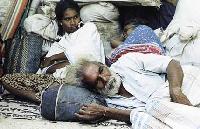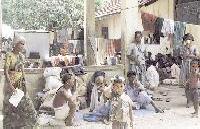

![]()
Government proposals on electoral reforms have run into opposition from several political parties.
The proposals released last week envisage a parliament of 198 members — 27 seats less than the present parliament. The voter would be given two ballot papers at elections to elect 99 MPs on territorial constituency basis on a 'first-past-the-post' system and to elect 95 other members on the basis of a regional list under the Proportional Representation system. Political parties or independent groups contesting in a region may nominate a list of candidates in a given order of priority.
The voter will indicate the party or group of his or her choice in the second ballot paper which, according to the proposals, will be counted to ascertain the allocation of seats to each party or group at the regional level.
Four seats will be allocated to members of political parties which have not gained a seat either on a territorial or regional basis. These members have to be from parties that contest at least five regions securing 0.5% of the total ballots cast for parties and groups at the regional level. The proposals state that the parties would be allocated a seat if the total number of valid votes they have received, when aggregated nationally, amounts to 0.005% of all the second ballot papers validly cast in the entire country.
The government believes that the intra-party rivalries and poster wars resulting from the infamous "preference vote" system, the large number of rejected votes owing to the complicated system of voting, the confusion in the mind of the average voter who found it difficult to identify his or her 'own' M.P. and the inability of smaller groups of interests to obtain representation due to the bonus seat concept and the threshold cut-off point which stifled the articulation of their point of view, will all be consigned to the past once the proposed system is adopted.
Commenting on the proposed electoral system, MEP Leader Dinesh Gunawardena said the system would promote regionalism, leading to further conflicts and an imbalance in parliament.
"This will once again create problems since today there are groups of members representing different regions. This is a dangerous trend after costly experiments on the district PR system twice."
He said the members to be elected on the basis of the PR system should be elected nationally and not regionally and the provision of four seats for smaller parties was a real joke.
Mr. Gunawardena said the MEP had submitted its proposals on the same basis on which it based its reforms forwarded to the last parliamentary committee on franchise and elections in 1988 and 1993.
"Our party is canvassing to change the election of 95 members on regional lists under the PR system and the provision of four seats for smaller political parties. What is sought to be elected is a national legislature and not regional parliaments.
This set of proposals of the government, if adopted will not reflect the national voting pattern and it will also seriously affect democracy. Our contention is that these 95 MPs should be elected under the PR system on the overall performance of these parties, that is notionally and not regionally.
The rationale behind the provision of four seats for smaller parties in itself is a joke," he said.
The MEP leader warned that the government's proposals are also linked to a federal constitutional package with plans to constitute regional states and that this effort should be defeated.
NDUNLF spokesman Ravi Karunanayake said his party opposed the system of regional representation because it would lead to a proliferation of racial, regional and religious parties.
He added that the 95 members to be elected on the basis of a regional list under the PR system should be on the overall percentage of the respective parties. "Otherwise it will be disproportionate to the total number of votes polled by such parties."
He said the very concept of making provision for four members to represent political parties which had not gained a seat either on territorial or regional basis was asinine and would create unwarranted problems. Moreover, the production of identity cards when voting and having an independent elections commission are a must.
"The whole question of reforming the electoral system should be delinked from the government's political package," he said.
The JVP, CWC the EPRLF and the ACTC said they were still studying the proposals.
Meanwhile, it is learnt that the LSSP, a constituent party of the governing People's Alliance, and the TULF will call for slight modifications to the proposed reforms. They will particularly call for an increase in the number of members to be elected territorially under the simple majority system.
General Secretary LSSP Batty Weerakoon stated that as the principles underlying the proposed electoral reform, which has been described as a guide to the Draft Constitutional Provisions, were generally in accordance with the LSSP's line of thinking, his party did not wish to create an issue out of this.
TULF President M. Sivasithambaram told 'The Sunday Times' that they accepted the proposals in principle but the reduction of the number of MPs to be elected from territorial constituencies would affect some of their areas. However, he was optimistic that the Delimitation Commission to be established would address its mind to this problem and would accordingly find a wayout.
Dr. Wickremabahu Karunaratne of the NSSP said that they would not object to the proposals even though they were not so much interested in reforms to the electoral system. "We are more interested in a democratic constitution which will have no place for the Executive Presidency and devolve more power to the periphery," he said.
Ivor Claudius Peter Hepponstal of Uisakha Road Colombo, died in a motor accident with Rs. 30,000 and his savings passbook on him. The money and the passbook are in the custody of the Colombo National Hospital.
The City Coroner Edward Ahangama was told that the 73-year-old Mr. Hepponstal was knocked down by a jeep going towards Colombo. He was crossing the road opposite the mosque at Wellawatte. He was taken to hospital with head and brain injuries. He died on admission.
The owner of the jeep N.P. Sidabaram a Colombo businessman said he bought the jeep three months ago but it was neither registered nor insured in his name.
Jeep driver who admitted the injured man to the hospital had given a false name. He called himself Mohammed Ali while in fact he was M. Satyapalan, police said.
Mr. Hepponstal's wife died earlier and their two sons are in Australia. The body was released to a nephew Nishantha Perera of Ragama.
The Coroner returned a verdict of death due to head injuries and ordered the police to produce the suspect driver before court.


The rutted roads and the partially damaged houses and buildings are still a common sight in the Jaffna peninsula where people have been yearning for peace over the years.
As the army motorcycle squad ride through the dusty roads people watch through their windows with uncertainty, written all over them.
Rehabilitation and reconstruction activities seemed to have been sidelined with the war taking the centre stage again with the launch of operation 'Jayasikurui". In a guided tour around the peninsula, civilians spoke of their harsh experiences.
'We don't want any Tamil armed group or the army to control us. We have no faith in any armed group'', seemed to be a common view of the civilians there. According to estimates by the Government Agent for Jaffna, C. Shanmuganathan, out of an estimated 600,000 population which fled the Jaffna peninsula so far 440,540 have returned.
Most of the civilians who have returned have not been fortunate enough to return to their original homes as their houses have been completely destroyed or they are not safe to return.
Many hundreds of civilians continue to live in refugee camps and temporary sheds.
According to civilians, some of the houses are occupied by the security forces and they are unable to return to their homes, but the overall commander for the Jaffna peninsula, Major General P.A. Karunatillake contradicts the claim saying that forces only occupy the houses in which the occupants have failed to return so far.
Resettlement and reconstruction work seems moving at snail space with the government officials maintaining that the main issue was that due to the lack of a supply route to the Jaffna peninsula they are not in a position to expedite the rehabilitation work.
'We have to bring everything needed for reconstruction work by ship and this is not practical,' a senior government official who wished to remain anonymous said.
Continue to the News/Comment page 4 - * Need of the hour: implementation of RKW recommendations, * Criminal defamation: journalists beware!
Return to the News/Comment contents page
![]()
| HOME PAGE | FRONT PAGE | EDITORIAL/OPINION | PLUS | TIMESPORTS
Please send your comments and suggestions on this web site to
info@suntimes.is.lk or to
webmaster@infolabs.is.lk